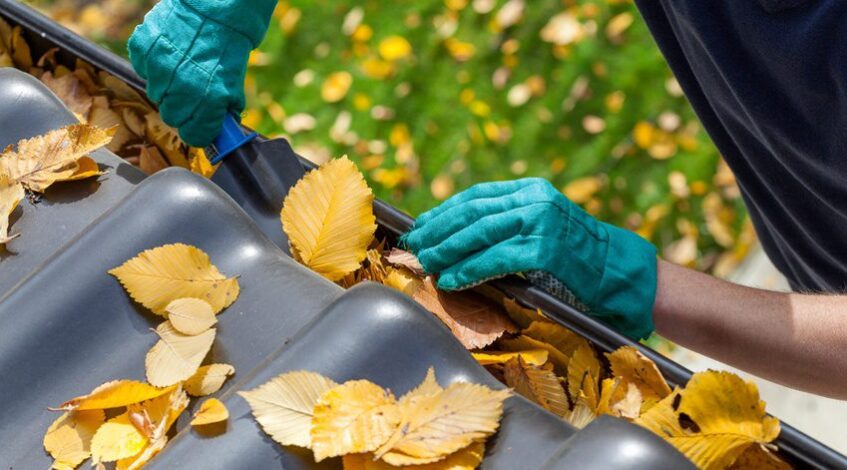Gutters are a vital part of your home’s drainage system, and while their primary role is to protect your home from water damage, they also have a significant impact on the environment. Proper gutter management can help conserve water, reduce soil erosion, and even improve the health of your local ecosystem. In this article, we’ll explore the environmental benefits of maintaining a well-functioning gutter system and how you can make eco-friendly choices for your home.
1. Reducing Soil Erosion
The Problem:
Without properly functioning gutters, rainwater flows directly off your roof, hitting the ground with force. This can erode soil around your home, washing away nutrients and destabilizing your landscaping.
The Solution:
- Install and Maintain Gutters: Gutters collect and channel rainwater safely away from your home, reducing soil erosion.
- Use Splash Blocks or Extensions: Direct water further from the foundation to protect nearby soil and plants.
Environmental Benefit:
Healthy soil supports plant growth, reduces sediment runoff into waterways, and contributes to a balanced ecosystem.
2. Preventing Water Pollution
The Problem:
Uncontrolled rainwater runoff can carry pollutants like soil, pesticides, and debris into storm drains, which often flow directly into rivers, lakes, and oceans.
The Solution:
- Install Downspout Filters: These help trap debris and pollutants before they enter local water systems.
- Direct Runoff to Rain Gardens: Rain gardens use native plants to filter water naturally before it reenters the ground.
Environmental Benefit:
Clean water supports aquatic ecosystems, protects wildlife, and ensures safe drinking water for communities.
3. Water Conservation with Rainwater Harvesting
The Problem:
Wasted rainwater contributes to water scarcity in areas prone to droughts or limited water resources.
The Solution:
- Add Rain Barrels to Your Gutter System: Rain barrels collect water from gutters, which you can reuse for irrigation, cleaning, or other non-potable purposes.
- Install a Complete Rainwater Harvesting System: Advanced systems store and filter rainwater for broader household use.
Environmental Benefit:
Harvesting rainwater reduces reliance on municipal water supplies, conserving resources and lowering your water bills.
4. Supporting Plant and Wildlife Health
The Problem:
Uncontrolled runoff can flood gardens, drown plants, and create habitats for pests like mosquitoes.
The Solution:
- Maintain Proper Drainage: Ensure gutters and downspouts direct water to appropriate locations.
- Create Habitat-Friendly Landscaping: Use gutter runoff to sustain plants that attract pollinators like bees and butterflies.
Environmental Benefit:
Balanced water management promotes thriving gardens and supports biodiversity by creating habitats for beneficial wildlife.
5. Minimizing Carbon Footprint
The Problem:
Poor gutter maintenance can lead to damage that requires frequent repairs or replacements, contributing to waste and emissions from manufacturing and transportation.
The Solution:
- Invest in Durable Gutters: Choose high-quality materials like aluminum or copper that last longer and are recyclable.
- Regular Maintenance: Keep gutters clean and functional to avoid premature replacement.
Environmental Benefit:
Long-lasting gutters reduce waste and lower the environmental impact of production and disposal.
6. Reducing Flood Risks
The Problem:
Clogged or damaged gutters can cause water to pool around your home’s foundation, increasing the risk of basement flooding and groundwater contamination.
The Solution:
- Inspect and Clean Gutters Regularly: Remove debris to prevent clogs and overflow.
- Upgrade Gutter Capacity: Use larger gutters or seamless designs to handle heavy rainfall efficiently.
Environmental Benefit:
Preventing flooding helps protect the local water table from contamination and reduces the strain on municipal drainage systems.
7. Preventing Urban Heat Island Effect
The Problem:
Hard surfaces like concrete driveways and roofs absorb heat, raising temperatures in urban areas. Improper drainage exacerbates this by preventing vegetation from thriving.
The Solution:
- Direct Gutter Runoff to Vegetation: Water trees, shrubs, and gardens with gutter runoff to encourage plant growth and cooling effects.
- Install Green Infrastructure: Use permeable paving and rain gardens to maximize water absorption and cooling.
Environmental Benefit:
Healthy vegetation cools urban areas, improves air quality, and reduces energy consumption for cooling.
Eco-Friendly Gutter Tips
- Install Gutter Guards: Reduce debris buildup and minimize maintenance with guards that allow water to flow freely.
- Opt for Sustainable Materials: Aluminum and copper gutters are recyclable and environmentally friendly.
- Direct Runoff to Sustainable Systems: Use rain gardens, barrels, or underground drainage systems to manage water effectively.
- Perform Regular Maintenance: Clean gutters at least twice a year to ensure they function optimally.
Conclusion
Proper gutter management not only protects your home but also benefits the environment in numerous ways. By preventing erosion, conserving water, reducing pollution, and supporting local ecosystems, your gutter system can play a vital role in creating a more sustainable future.
Want to make your home eco-friendlier? Check out our blog for more tips on sustainable home maintenance and upgrades!

